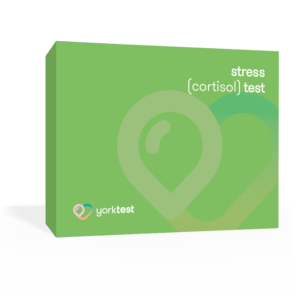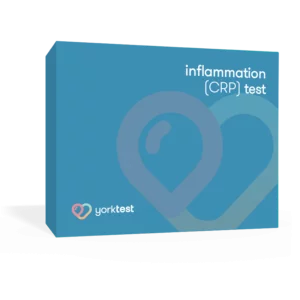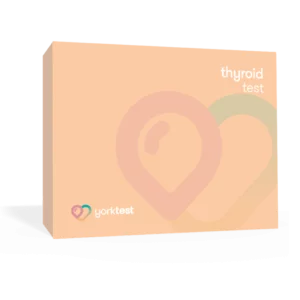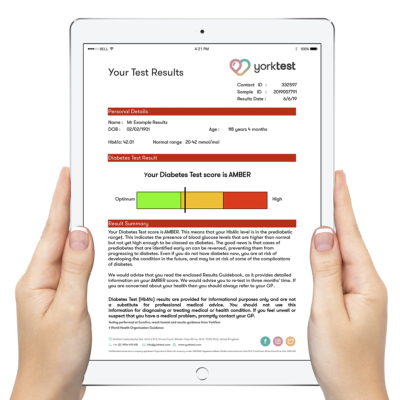- What Is A Milk Allergy?
- What Are The Symptoms Of A Milk Allergy?
- Can You Be Allergic To Milk Later In Life?
- Is There A Test For Milk Allergies?
- Lactose Intolerance Vs Milk allergy?
- What’s The Difference Between Milk allergy, Milk Intolerance And Lactose Lntolerance?
- Share this infographic on your site
- Are All Milk Intolerance Or Milk Allergy Reactions The Same?
- Choose the test that’s right for you
- What our customers say about us on Trustpilot
- Customer Testimonials
- Emily Catterall, 24: IBS
- Sally Gunnell OBE, 52: Energy levels
- Join us on social media
Milk is one of the most commonly consumed products in the world. When we think about milk, as well as the liquid itself, we tend to think about all the products that are made from milk – such as yoghurts, butter, ice cream, cheese, chocolate etc. Cow’s milk is commonly consumed in the UK, along with sheep and goat’s milk. Milk provides the primary source of nutrition for babies before they are able to digest other types of food, and is found across many cuisines all over the world.
But what happens when you’re experiencing some uncomfortable side effects when you consume milk?
What Is A Milk Allergy?
A milk allergy is an adverse reaction involving your immune system which mistakenly treats milk proteins as a threat (as if they’re dangerous invaders). Usually, it takes just a short period of time for symptoms of a milk allergy or dairy allergy to show, often within a few hours. The severity of the allergic reactions can be mild or severe, however in some cases, without medical help, this may lead to anaphylaxis that can be fatal.
What Are The Symptoms Of A Milk Allergy?
Milk allergy reactions can come on very rapidly. Symptoms include:
- A milk allergy rash or hives
- Swollen tongue or lips
- Wheezing and chest tightness
- Itchy, red and watery eyes
- Difficulty breathing
- Vomiting or feeling nauseous
- Diarrhoea
It’s important to consult your GP if you feel that you may have a milk allergy. The most common food allergy tests are a skin-prick test or a blood test to look for the presence of immunoglobulin antibodies (IgE). Milk allergy symptoms can be improved by avoiding dairy products and by the administration of epinephrine (adrenaline) if they become severe.
Find out more about dairy intolerance here.
Can You Be Allergic To Milk Later In Life?
Though a milk allergy can sometimes be outgrown, there is a chance that this could stay with you for life. Milk is a common food allergy in infants and young children, but it is thought that most children (over 80%) outgrow their allergy by the time they’re 16.
Is There A Test For Milk Allergies?
If you feel that you could have an allergy to milk or a dairy allergy, it is important to visit your GP. At your consultation, your doctor may refer you for a skin-prick test. During this test, your skin is pricked and exposed to minute traces of proteins found in milk, to monitor your allergy reaction. You may also have a blood test that measures your immune system’s response to milk. This measures the amount of IgE antibodies in your blood, and can tell if you have a dairy allergy or are allergic to milk.
What Is Lactose Intolerance?
Lactose intolerance is a condition that cannot be outgrown or cured. It’s a common digestive problem where the body is unable to digest lactose, which is a sugar found in milk products. Generally, we are born with lactase enzymes which break down the sugar in the digestive tract. However, over time, the body may not be able to produce enough of the lactase enzyme, causing you to be lactose intolerant.
What Are The Symptoms Of Lactose Intolerance?
Signs of lactose intolerance can often be mistaken for a milk intolerance and/or a milk protein allergy, though a person can suffer from both a milk protein intolerance and lactose intolerance. Reactions could begin between 30 minutes to 2 hours later.
Common Lactose Intolerance Symptoms
- Abdominal bloating, pain and cramps
- Flatulence and gas
- Nausea
- Gurgling in the stomach
- Diarrhoea
Please note, constipation is not a symptom of lactose intolerance.
How Does Lactose Intolerance Differ From A Milk Allergy And A Milk Intolerance?
It can be very confusing to wrap your head around the differences between all three conditions which involve troublesome reactions when milk is consumed. Milk allergy and milk intolerance * are potentially reactions to the protein found in milk, whereas lactose intolerance is a digestive reaction to the sugar found in milk.
If a person with lactose intolerance drinks milk, they may suffer from bothersome symptoms, similar to a milk protein intolerance.
What Happens To The Body When Someone Is Lactose Intolerant?
When someone has lactose intolerance, they may experience unpleasant gastrointestinal reactions as a result of their body being unable to fully digest the lactose (sugar) in milk. This is due to the small intestine not making enough of a digestive enzyme (lactase) to break down the lactose in milk and other dairy products. This, in turn, leaves undigested lactose in the digestive system where it’s fermented by bacteria and produces unwanted digestive problems.
Lactose Intolerance Vs Milk allergy?
A milk allergy (like any food allergy) can be potentially fatal – this is not the case for milk intolerance or lactose intolerance. People who are allergic to milk react to one or more milk proteins (casein and whey). When these are consumed, the body’s immune system thinks these proteins are harmful invaders and begins to fight them off.
The body does this by producing antibodies called immunoglobulin E (IgE) – these antibodies then produce chemicals that cause the symptoms we know as an allergic reaction. With a lactose intolerance, rather than an IgE reaction, your body struggles to produce enough lactase and thus has a reaction to the undigested lactose.
What’s The Difference Between Milk allergy, Milk Intolerance And Lactose Lntolerance?
We’ve created this infographic below to avoid confusion surrounding lactose intolerance, milk allergy, and milk intolerance; and to show you the difference between the three conditions:
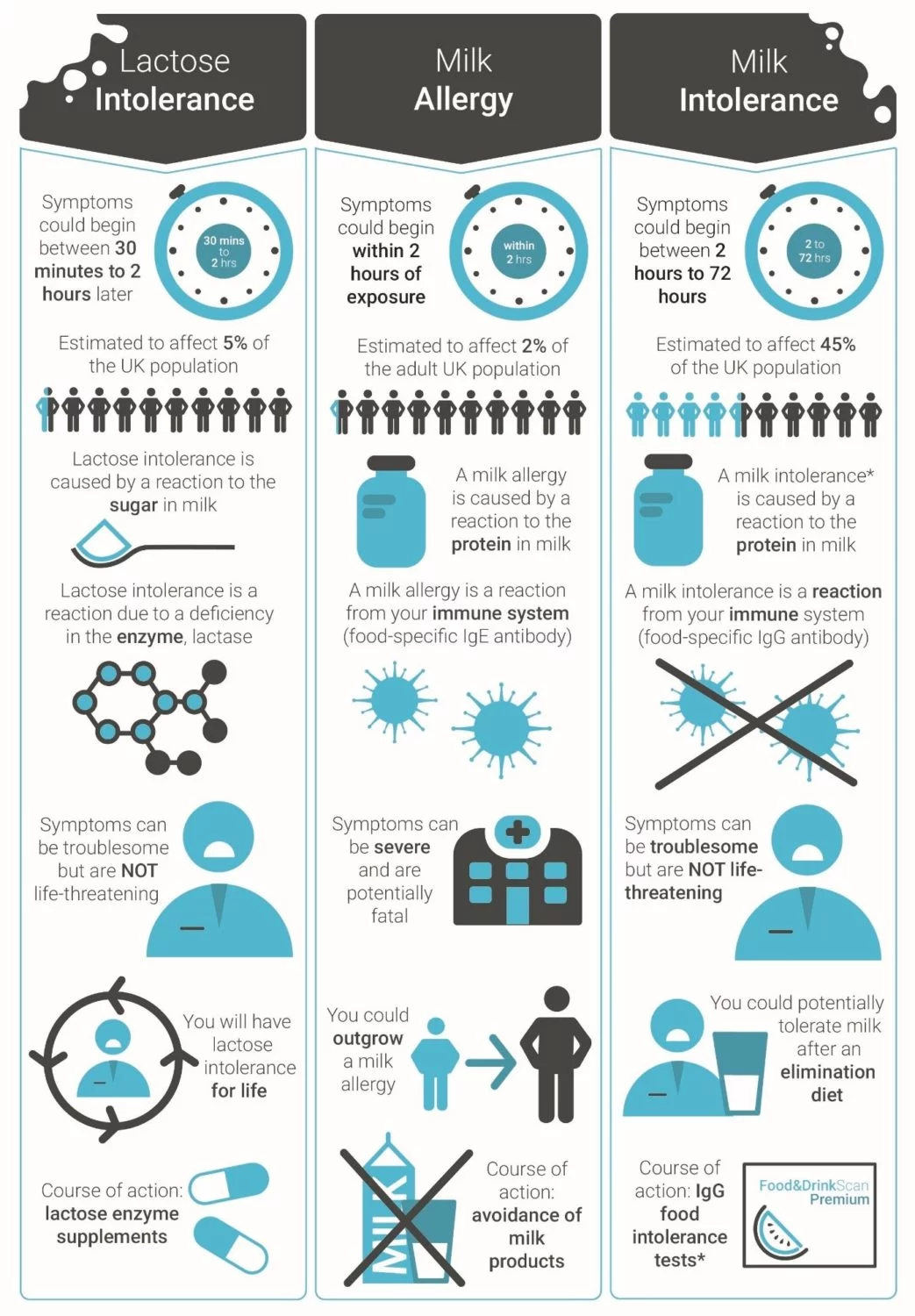
Share this infographic on your site
Milk allergy vs Milk Intolerance infographic created by yorktest
What Is Milk Intolerance?
Did you know it is estimated that 45% of the population suffer from food intolerance†? Unlike a food allergy where symptoms come on rapidly, food intolerance symptoms can manifest relatively slowly. Symptoms are not life-threatening, unlike a food allergy, but they are often bothersome and can affect your quality of life. A milk intolerance is not necessarily lifelong and milk can sometimes be reintroduced after a period of elimination, as symptoms improve
What Are The Signs And Symptoms Of Milk Intolerance?
Milk (protein) intolerance causes a delayed response, taking up to 3 days to cause a noticeable reaction, and can result in a wide range of symptoms, such as:
- Irritable bowel (IBS)
- Bloating
- Headaches
- Joint pain
- Respiratory problems
- Fatigue
- Skin issues, such as Acne and Eczema
If you have a milk protein intolerance then you should avoid all animal milk as the milk from cows, sheep and goats are all very similar, unless they are individually tested.
For more information on dairy intolerance, you can read our Advice Page to get the lowdown on how to test for a milk intolerance, how you can get enough calcium when you’re avoiding milk, and milk-free foods.
Are All Milk Intolerance Or Milk Allergy Reactions The Same?
As individuals, what one person might react to may not be the same as another person. Here at YorkTest, we call this your own ‘food fingerprint’.
If you think that you might be intolerant to milk, there could be other food intolerances you may have which you may not realise. It is estimated that 45% of people have some kind of food intolerance and, on average, those with positive reactions react to about 5 different foods which may or may not include milk. Therefore, it’s worth considering an IgG food intolerance test.
How Do You Test For A Milk Intolerance?
YorkTest’s Premium Food Intolerance Test checks for milk intolerance including cow’s milk, goat’s milk and sheep’s milk. With 40 years’ experience in food intolerance and food allergy testing, and as a leading home health test provider, we work with you to optimise your diet and help take control of your health and wellbeing.
What Is A Food Intolerance Test?
YorkTest’s Premium Food Intolerance Test analyses your IgG reactions over 200 food and drink ingredients.
It’s a simple home-to-laboratory finger-prick test that provides nutritional consultations with a registered nutritional therapist and extra support to optimise your diet.
Further Support
Whether it’s to ask a quick question about non-dairy products or to purchase a test, you can call our friendly Customer Care team on our freephone number:01904 410 410.
Liked This? You Might Also Be Interested In:
Dairy Intolerance Advice Page
Your guide to dairy intolerance – including testimonials, how to find non-dairy food products, analysing food labels, and the difference between lactose intolerance and a milk protein intolerance.
5 Food Swaps For Your Food Intolerances
Did you know the average person reacts to more than one food and drink ingredient? Find out what other alternatives you can have to support your elimination diet.
Balancing Your Nutrients
Choose the test that’s right for you
What our customers say about us on Trustpilot
Customer Testimonials
Emily Catterall, 24: IBS
“I feel like I’m in a new body! I’m so much healthier. I can’t tell you how amazingly different I have felt since!â€
Sally Gunnell OBE, 52: Energy levels
“I’m not waking up as much during the night, not as bunged up in my nose and I’ve got so much more energyâ€



